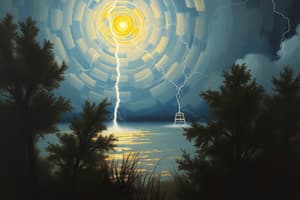Podcast
Questions and Answers
What is the interaction between electrically charged particles and the magnetic field they create known as?
What is the interaction between electrically charged particles and the magnetic field they create known as?
- Potential Difference
- Magnetic Resonance
- Electromagnetism (correct)
- Electric Conduction
What does potential difference measure in an electrical circuit?
What does potential difference measure in an electrical circuit?
- Resistance
- Energy per unit charge (correct)
- Magnetic force
- Temperature difference
According to Ohm's Law, what is the relationship between current, voltage, and resistance in a circuit?
According to Ohm's Law, what is the relationship between current, voltage, and resistance in a circuit?
- Resistance is directly proportional to voltage
- Current is directly proportional to resistance
- Voltage is inversely proportional to current
- Current is directly proportional to voltage (correct)
Which equation represents Ohm's Law relating voltage, current, and resistance?
Which equation represents Ohm's Law relating voltage, current, and resistance?
How is current related to the number of charges flowing through a circuit under constant voltage?
How is current related to the number of charges flowing through a circuit under constant voltage?
What does potential difference measure in terms of moving electric charge through a conductor?
What does potential difference measure in terms of moving electric charge through a conductor?
What is the definition of the electric field?
What is the definition of the electric field?
Which formula correctly represents the potential difference between two points?
Which formula correctly represents the potential difference between two points?
In the context of electricity, what does power represent?
In the context of electricity, what does power represent?
How are power and current related in a circuit?
How are power and current related in a circuit?
What crucial role do electromagnetism and potential difference play in technology?
What crucial role do electromagnetism and potential difference play in technology?
How do electromagnetism and potential difference impact electronic devices?
How do electromagnetism and potential difference impact electronic devices?
Flashcards are hidden until you start studying
Study Notes
Electromagnetism and Potential Difference in Physics
Electromagnetism and the concept of potential difference are fundamental to the field of physics. These ideas have shaped our understanding of electricity and its applications in everyday life.
Electromagnetism
Electromagnetism is the interaction between electrically charged particles and the magnetic field they create. This interaction is governed by Maxwell's equations, which describe the behavior of electric and magnetic fields in various situations.
Potential Difference
Potential difference, or voltage, is the energy per unit charge that exists between two points in an electrical circuit. It is a measure of the ability of a source to move electric charge through a conductor.
Voltage and Current
Potential difference and current are closely related. For a constant voltage, the current in a circuit is directly proportional to the number of charges flowing through it.
Ohm's Law
Ohm's law describes the relationship between voltage, current, and resistance in a circuit. It states that the current in a conductor between two points is directly proportional to the potential difference across those two points and is inversely proportional to the resistance of the conductor.
[ V = I \times R ]
where (V) is the voltage, (I) is the current, and (R) is the resistance.
Potential Difference and Electric Field
Potential difference is also related to the electric field between two points. The electric field, (\mathbf{E}), is defined as the force per unit charge acting on a test charge in the field. The potential difference between two points is the integral of the electric field along a path connecting the two points.
[ V = -\int_{p_1}^{p_2} \mathbf{E} \cdot d\mathbf{l} ]
where (V) is the potential difference between points (p_1) and (p_2), and (\mathbf{E}) is the electric field.
Energy and Power
Potential difference and current are also related to the concept of energy and power in a circuit. The power (P) is the rate at which energy is transferred by the electric field. The power is equal to the product of the voltage and current.
[ P = V \times I ]
Applications
Understanding electromagnetism and potential difference has numerous applications in technology and everyday life. For example, it plays a crucial role in electricity generation, transmission, and utilization. It also influences the development of electronics, such as transistors, integrated circuits, and electric motors.
Summary
Electromagnetism and potential difference are essential concepts in physics, shaping our understanding of electricity and its applications. They have numerous applications in technology and everyday life, from electricity generation to electronic devices. Understanding these concepts helps us to better appreciate the complex world of physics.
Studying That Suits You
Use AI to generate personalized quizzes and flashcards to suit your learning preferences.




